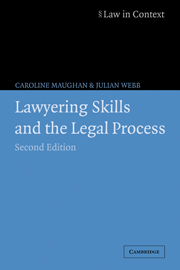Book contents
- Frontmatter
- Contents
- Preface to the second edition
- Table of Statutes
- Table of Cases
- Introduction
- 1 Descent into the swamp
- 2 Learning to live in the swamp
- 3 Law talk and lay talk: lawyers as communicators
- 4 You'll never work alone: group learning and group skills
- 5 Interviewing: building the relationship and gaining participation
- 6 The ‘good lawyer’: ethics and values in legal work
- 7 Clarifying language: making sense of writing
- 8 Manipulating language: drafting legal documents
- 9 Handling conflict: negotiation
- 10 Advocacy: case management and preparation
- 11 Into court: the deepest swamp?
- Index
Preface to the second edition
Published online by Cambridge University Press: 05 June 2012
- Frontmatter
- Contents
- Preface to the second edition
- Table of Statutes
- Table of Cases
- Introduction
- 1 Descent into the swamp
- 2 Learning to live in the swamp
- 3 Law talk and lay talk: lawyers as communicators
- 4 You'll never work alone: group learning and group skills
- 5 Interviewing: building the relationship and gaining participation
- 6 The ‘good lawyer’: ethics and values in legal work
- 7 Clarifying language: making sense of writing
- 8 Manipulating language: drafting legal documents
- 9 Handling conflict: negotiation
- 10 Advocacy: case management and preparation
- 11 Into court: the deepest swamp?
- Index
Summary
This book provides a bridge between academic and practical law. Its purpose is to introduce you to a set of highly transferable oral and written communication, group working, problem-solving and conflict resolution skills, and to develop them in a range of lawyering contexts: client interviewing, drafting, managing cases, legal negotiation and advocacy. The aims of this exercise are not to turn you, the reader, into a ready-formed legal practitioner, but:
to help you develop a range of skills and attributes that will be useful to you in a variety of occupational settings;
to enable you to experience and reflect critically on the problems and uncertainties of ‘real’ law, from the perspective of both lawyers and their clients;
to enhance your understanding of the interplay between legal knowledge, skills and values in the lawyering process;
to encourage and empower you to understand your own learning processes and to reflect critically upon them.
It is this dual emphasis on understanding lawyers' skills ‘in context’ – whereby our understanding is shaped by the contributions of socio-legal research into what lawyers do – and on reflection and critique which we believe distinguishes our ‘academic’ approach from the more functional emphasis of the vocational courses. At the same time we share with the vocational courses (and any undergraduate skills-based course for that matter) a belief that learning has to be grounded in doing. Skills are not acquired passively, but actively by experimentation and practice.
- Type
- Chapter
- Information
- Lawyering Skills and the Legal Process , pp. xvii - xviiiPublisher: Cambridge University PressPrint publication year: 2005



